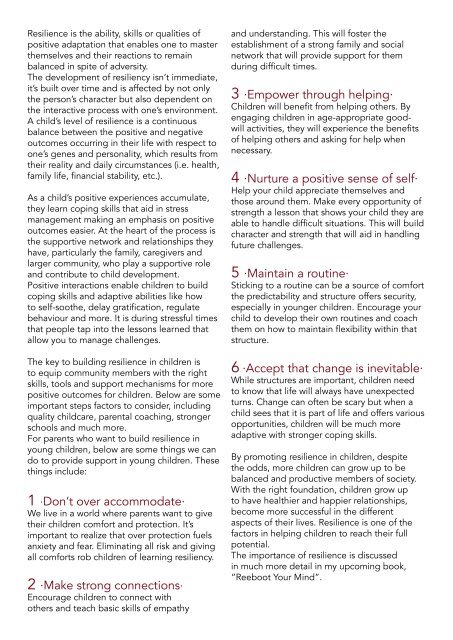Locale Hub 4300 - Issue 1
Create successful ePaper yourself
Turn your PDF publications into a flip-book with our unique Google optimized e-Paper software.
Resilience is the ability, skills or qualities of<br />
positive adaptation that enables one to master<br />
themselves and their reactions to remain<br />
balanced in spite of adversity.<br />
The development of resiliency isn’t immediate,<br />
it’s built over time and is affected by not only<br />
the person’s character but also dependent on<br />
the interactive process with one’s environment.<br />
A child’s level of resilience is a continuous<br />
balance between the positive and negative<br />
outcomes occurring in their life with respect to<br />
one’s genes and personality, which results from<br />
their reality and daily circumstances (i.e. health,<br />
family life, financial stability, etc.).<br />
As a child’s positive experiences accumulate,<br />
they learn coping skills that aid in stress<br />
management making an emphasis on positive<br />
outcomes easier. At the heart of the process is<br />
the supportive network and relationships they<br />
have, particularly the family, caregivers and<br />
larger community, who play a supportive role<br />
and contribute to child development.<br />
Positive interactions enable children to build<br />
coping skills and adaptive abilities like how<br />
to self-soothe, delay gratification, regulate<br />
behaviour and more. It is during stressful times<br />
that people tap into the lessons learned that<br />
allow you to manage challenges.<br />
The key to building resilience in children is<br />
to equip community members with the right<br />
skills, tools and support mechanisms for more<br />
positive outcomes for children. Below are some<br />
important steps factors to consider, including<br />
quality childcare, parental coaching, stronger<br />
schools and much more.<br />
For parents who want to build resilience in<br />
young children, below are some things we can<br />
do to provide support in young children. These<br />
things include:<br />
1 ∙Don’t over accommodate∙<br />
We live in a world where parents want to give<br />
their children comfort and protection. It’s<br />
important to realize that over protection fuels<br />
anxiety and fear. Eliminating all risk and giving<br />
all comforts rob children of learning resiliency.<br />
2 ∙Make strong connections∙<br />
Encourage children to connect with<br />
others and teach basic skills of empathy<br />
and understanding. This will foster the<br />
establishment of a strong family and social<br />
network that will provide support for them<br />
during difficult times.<br />
3 ∙Empower through helping∙<br />
Children will benefit from helping others. By<br />
engaging children in age-appropriate goodwill<br />
activities, they will experience the benefits<br />
of helping others and asking for help when<br />
necessary.<br />
4 ∙Nurture a positive sense of self∙<br />
Help your child appreciate themselves and<br />
those around them. Make every opportunity of<br />
strength a lesson that shows your child they are<br />
able to handle difficult situations. This will build<br />
character and strength that will aid in handling<br />
future challenges.<br />
5 ∙Maintain a routine∙<br />
Sticking to a routine can be a source of comfort<br />
the predictability and structure offers security,<br />
especially in younger children. Encourage your<br />
child to develop their own routines and coach<br />
them on how to maintain flexibility within that<br />
structure.<br />
6 ∙Accept that change is inevitable∙<br />
While structures are important, children need<br />
to know that life will always have unexpected<br />
turns. Change can often be scary but when a<br />
child sees that it is part of life and offers various<br />
opportunities, children will be much more<br />
adaptive with stronger coping skills.<br />
By promoting resilience in children, despite<br />
the odds, more children can grow up to be<br />
balanced and productive members of society.<br />
With the right foundation, children grow up<br />
to have healthier and happier relationships,<br />
become more successful in the different<br />
aspects of their lives. Resilience is one of the<br />
factors in helping children to reach their full<br />
potential.<br />
The importance of resilience is discussed<br />
in much more detail in my upcoming book,<br />
“Reeboot Your Mind”.
















